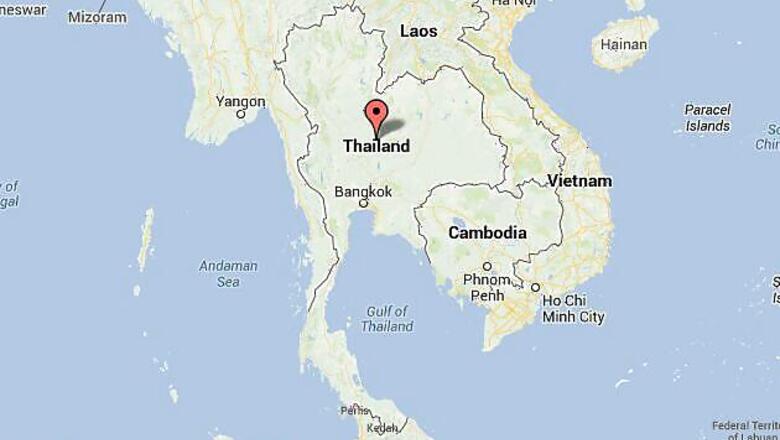
views
An explosive device tossed at anti-government protesters wounded 36 in central Bangkok on Friday and tension rippled through the Thai capital after several days of relative calm that had suggested the movement was running out of steam.
Protest leader Suthep Thaugsuban blamed the government for the attack and said it would not dent the morale of thousands who on Monday stepped up a two-month agitation, bringing parts of Bangkok to a standstill and occupying ministries.
"The explosion was the government's doing," Suthep said at a rally later on the edge of the capital's Lumpini Park. "We are not afraid and we will fight on."
It was not immediately clear if the attack would bring an escalation of the crisis, but it could raise the risk of a move by the country's army to end the impasse.
"Today's incident will accelerate chances of a significant clash between the protesters and groups they perceive to be their enemies, the police or forces loyal to the government, in order to provoke some sort of military reaction and speed up chances of a military intervention," said Boonyakiat Karavekphan, an analyst at Ramkamhaeng University in Bangkok.
Police said the explosive was hurled at demonstrators marching near Chulalongkorn University in the city centre with Suthep, who was unharmed. It was not immediately clear who was responsible and the nature of the device was unknown as forensic experts were prevented by protesters from entering the area.
The Erawan Medical Center, which monitors Bangkok hospitals, said 36 people were wounded. An official at one hospital said it had received 12 injured, one of whom was in a serious condition.
The turmoil is the latest episode in an eight-year conflict pitting Bangkok's middle class and royalist establishment against poorer, mainly rural supporters of Prime Minister Yingluck Shinawatra and her brother, the self-exiled former premier Thaksin Shinawatra.
The protesters accuse the pair of corruption, and want Yingluck to step down to make way for an unelected "people's council" to push through broad political reforms.
She now heads a caretaker administration ahead of an election that has been called for February 2.
Strong support from rural voters has enabled Thaksin or his allies win every election since 2001 and Yingluck's Puea Thai Party seems certain to win the upcoming vote. But the protesters and opposition parties are boycotting next month's poll and want the prime minister to step down immediately.
The government rejected Suthep's charge that it was responsible for the attack on the protesters.
"The movement is desperate," said Anusorn Iamsa-ard, deputy spokesman for the Puea Thai Party. "Its attempt to shut down this city has not been successful so it is trying different tactics, including staging attacks and blaming them on the government."
The agitation that began in November has been relatively peaceful until now, though sporadic flare-ups between protesters, police and government supporters have left eight people dead and scores injured.
The demonstrations are the biggest since pro-Thaksin protesters paralysed Bangkok in April-May 2010. That movement ended with a military crackdown and more than 90 people, mostly protesters, were killed during the events.
Pro-government "red shirt" protesters have stayed outside Bangkok this time, limiting the risk of factional clashes.
The stock market .SETI fell as investors cut some risk exposure after the blast, ending 0.5 percent lower. The baht currency also fell but was a shade higher on the day.
Foreign Minister Surapong Tovichakchaikul earlier said it was "about time" to take back control of Bangkok and that a delegation of officials, escorted by police and troops, would make a start by going to a government office that issues passports to try to persuade the protesters to let work resume.
Asked if the government was now moving to end the blockade of ministries and key intersections, he told a news conference: "Soon. It's about time. We have to start to do something."
In the event, the delegation never made it.
"Our security adviser, given the explosion earlier, advised us not to go," said Foreign Ministry spokesman Sek Wannamethee.
Earlier, hundreds of people on motorbikes and in other vehicles drove to the area where the passport office is located and a confrontation ensued with protesters, National Security Council Secretary-General Paradorn Pattanatabut told Reuters.
"They said they were angry at the anti-government crowd who blocked traffic there and stopped them from getting access to government services, especially the passport office," he said.
Reuters reporters said at least 2,000 protesters in pickup trucks and vans headed towards a printing works in the north of the city, saying it was producing election ballot papers and claiming it would be printing far more than were needed.
As the deadlock between the government and protesters drags on, many Thais believe the military could step in to break the impasse, especially if the protests turn more violent.
The army has staged or attempted 18 coups in 81 years of on-off democracy but has tried to remain neutral this time.
Security forces have largely kept out of sight since the blockades began this week, with the government reiterating on Friday it was keen to avoid any confrontation.




















Comments
0 comment